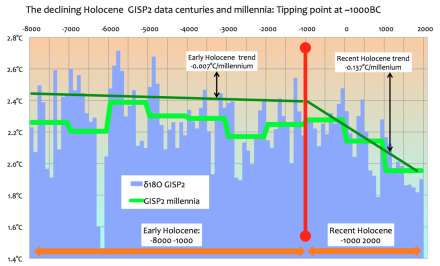washingtonpost.com
One million species face extinction, U.N. report says. And humans will suffer as a result.
(Reuters)
8-10 minutes
May 6 at 9:45 AM
One million plant and animal species are on the verge of extinction, with alarming implications for human survival, according to a United Nations report released Monday.
The landmark report by seven lead co-authors from universities across the world goes further than previous studies by directly linking the loss of species to human activity. It also shows how those losses are undermining food and water security, as well as human health.
More plants and animals are threatened with extinction now than any other period in human history, it concludes. Nature’s current rate of decline is unparalleled, and the accelerating rate of extinctions “means grave impacts on people around the world are now likely," it says.
In a prepared statement, Robert Watson, a British chemist who served as the panel’s chairman, said the decline in biodiversity is eroding “the foundations of our economies, livelihoods, food security, health and quality of life worldwide.”
Nearly 150 authors from 50 nations worked for three years to compile the report by the Intergovernmental Science-Policy Platform on Biodiversity and Ecosystem Services — a panel with 132 member nations, including the United States. Representatives of each member nation signed off on the findings.
[Read the U.N. report: Species extinction is accelerating]

Moe Flannery of the California Academy of Sciences inspected a dead gray whale in Tiburon, Calif., last month, one of seven whales that have washed up on the shores of the San Francisco Bay and along the coast in recent weeks. (Justin Sullivan/Getty Images)
The authors urge the world’s governments to address the global decline of biodiversity together with human-caused climate change. The warming climate is a major driver that is exacerbating the effects of overfishing, widespread pesticide use, pollution and urban expansion into the natural world.
For example, ocean ecosystems are degrading as temperatures rise toward 2 degrees Celsius — 3.6 degrees Fahrenheit — above preindustrial levels, the study warns. Coral reefs lost to warming and acidifying oceans could cause a collapse in commercial and indigenous fisheries, affecting billions of coastal residents who rely on seafood for protein.
“Once you get to basically 2 degrees Celsius, the models show that only 1 percent can survive,” Watson said. “Let’s be quite candid. We’re not on the pathway to 2 degrees Celsius. We’re on a pathway to 3, 3 ½ degrees Celsius. The coral system is truly in trouble.”
The report emphasizes the effects humans have on animals that are key to their own survival. Pesticides sprayed by farmers kill pollinators such as bees and other insects will likely to have a devastating effect on crops. Homeowners contribute to the problem by purchasing “bug zappers” that target mosquitoes but also eliminate key pollinators such as butterflies and moths, as well as common flies that some animals rely on for food.
Global trade has introduced invasive species to countries with devastating effects, such as crop-destroying stink bugs and tree-killing emerald ash borer in the United States. Travelers exploring forests in other countries have returned home with microbes that cause diseases lethal to animals, such as the white nose fungus that is killing millions of bats whose immune systems have not adapted to fight it.
“The most important thing isn’t necessarily that we’re losing . . . 1 million species — although that’s important, don’t misunderstand me,” Watson said during a teleconference Sunday. “The bigger issue is the way it will affect human well-being, as we’ve said many times — food, water, energy, human health.
“We care about nature, but we care about human well-being,” Watson said. “We need to link it to human well-being; that’s the crucial thing. Otherwise we’re going to look like a bunch of tree-huggers.”
The report has a positive spin, saying that “it is not too late to make a difference.” But that difference requires more than 100 developing and nondeveloped nations to work together to bring about change.
Nations that signed off on the study’s findings acknowledged that opposition from rich people invested in the status quo is expected.
“Since 1992, we’ve been telling the world we have a problem,” Watson said. “Now what’s different? It’s much worse today than it was in 1992. We’ve wasted all of the time . . . the last 25 years.” However, he said, “we have a much better understanding of the links between climate change, biodiversity, and food security and water security.”
The report’s authors noted that the world’s population has tripled since 1950 and that urban areas worldwide have doubled since 1992. By mid-century, the world’s population is expected to approach 9 billion.
The resulting pressure on natural resources has been enormous. Seventy-five percent of the land environment and well more than half the marine environment have been altered by humans.
On land, “more than a third of the world’s land surface and nearly 75 percent of freshwater resources are now devoted to crop or livestock production,” the report says. Farms that cut into forests that trap carbon have expanded exponentially, increasing crop production by 300 percent since 1970.
At sea, a third of marine fish stocks were being harvested at unsustainable levels in 2015. “Sixty percent were maximally sustainably fished,” meaning they were being pushed to the verge of collapse.

Onlookers stand before paper mache replicas of the critically endangered porpoise known as the vaquita during an event in front of the Mexico’s National Palace in Mexico City. (Rebecca Blackwell/AP)
Humans extract 60 billion tons from nature each year to satisfy demands worldwide for crops, fish, minerals and other goods, the authors said. They concluded that the harvest is unsustainable.
The U.N. report followed a study in January that predicted a bug massacre — 40 percent of all known species face extinction, including beetles, flies, moths, butterflies and bees, the result of habitat loss and pesticides.
The United States is hardly immune to the loss of biodiversity. In recent weeks, the federal government moved to protect a declining group of Bryde’s whales in the Gulf of Mexico with an endangered listing because fewer than 100, and possibly as few as 45, are estimated to exist.
In January, wild reindeer were declared extinct in the Lower 48 states. Wildlife managers in British Columbia caught the last female in a herd of caribou that once migrated between the Pacific Northwest and Canada and stuck her in a pen because “that animal was not going to survive,” an official said.
Meanwhile, a doomsday count on the tiny vaquita porpoise in the Gulf of California is nearing zero. As Mexican fisherman continue to poach shrimp and fish consumed in the United States, vaquitas occasionally show up dead in their fishing nets.
In Antarctica, the second-largest group of emperor penguins, the tallest of all penguins, has not produced offspring for three years, assuring a catastrophic drop in their numbers.
The U.N. report “means that nature is collapsing around us, and it’s a real wake-up call to humanity,” said Andrew Wetzler, managing director of the nature program for the Natural Resources Defense Council, a conservation group.
Oceana senior adviser Philip Chou called the report a beacon for more action to address a crisis.
“We are seeing alarming increases in the deaths of fish, marine mammals and turtles ingesting plastics,” Chou said. “These plastics break apart in the ocean into microscopic particles [that are] consumed by fish, fish we now eat.”




